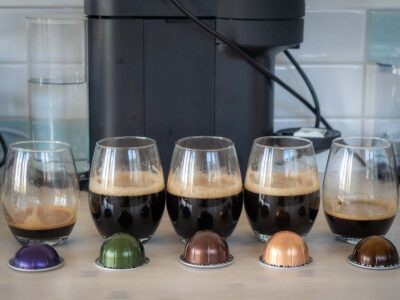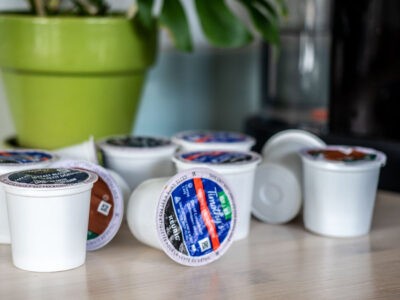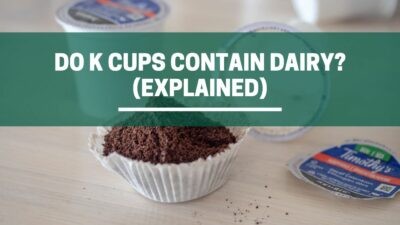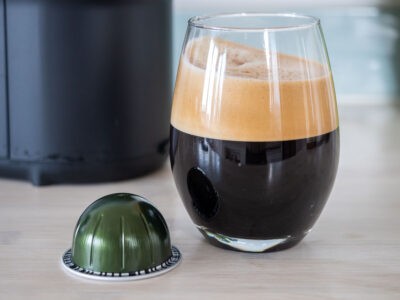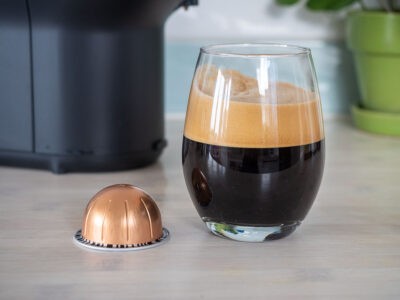Nespresso Guides
Can You Drink Coffee Before Bed? (What The Science Says!)
If you love your coffee, it’s pretty understandable to get those cravings for another delicious cuppa – even right before bedtime.
For most of us, logic prevails and the fear of caffeine-induced insomnia stops us in our tracks. But for others, like the Italians for example, an after-dinner espresso is the normal tradition. So this begs the question, can you drink a coffee before bed?
Interestingly, while common sense may suggest a drug that induces an elevated heart rate, and increased mental focus would be detrimental to sleep, the scientific evidence on the matter is actually mixed.
Why Listen To Us? Well, because we KNOW coffee! In fact, we make our own coffee, coffee machine cleaners, and reusable capsules which we've sold to over 41 countries. Our team ouf experts include Tristan (an engineer), Claire (a food writer) and Richy (a barista). So, whether you're looking for a recipe or repair guide, we've got you covered 💚
Table of Contents
Quick Answer:
Caffeine begins to affect your body very quickly. It reaches a peak concentration level in your blood within 30 to 60 minutes. It also has a half-life of 3 to 5 hours, which means roughly every 4 hours the amount off caffeine left in your system halves. Therefore, most people will have impiared sleep if consiuming coffee 4 – 8 hours before bedtime.

What does Science say about caffeine and sleep disorders?
Caffeine can affect both the quantity and quality of your sleep. Numerous studies into the effects of caffeine on total sleep time (TST) have found a strong link between the quantity of caffeine consumed and the proximity before bed time relative to a placebo.
These effects also can be stronger if you are older, as it takes your body more time to process caffeine.
Another study from Florida Atlantic University, Harvard, Emory, and Mississippi Medical Center looked into the effects of alcohol, nicotine, and caffeine before bed. The study found that drinking coffee before bed does not affect sleep. Or, if it does, its effects are still less relevant than those of alcohol and nicotine.
To specify, the research followed 785 African Americans for about 14 years. And the caffeine intake was nothing more than one cup within 4 hours before sleep. The researchers found out that there is no direct causation between caffeine and insomnia.
Without a doubt, caffeine dosing and personal tolerance vary from person to person. So, one cannot conclude that everyone reacts the same way. But the data tell a story. Even after considering factors that could have influenced their sleep, such as age, sex, physical structure, next day’s schedule, etc., caffeine was found to have a very limited impact on sleep disorders.
Does coffee help you sleep better?
The Bad:
Caffeine can affect both how good you sleep, and how long you sleep for. It can make it hard for you to fall asleep. One study found that having caffeine 6 hours before bedtime reduced total sleep time by 1 hour. It may also delay the timing of your body clock and reduce the amount of deep sleep that you get.
The Good:
In 1997, a study on the combination of caffeine with a short nap gave rise to the coffee nap expression. These researchers found out that a quick 15-minute nap after a cup of coffee helps drivers to be more alert. Not only that, these drivers performed better than colleagues that only drank coffee or a placebo.
The explanation of these results is quite simple. In fact, caffeine is an adenosine inhibitor. To clarify, adenosine is the chemical compound that induces deep sleep. But, your body only needs 20 minutes to release it, leaving you tired and drowsy upon awakening.
When dozing off right after drinking coffee, you feel the stimulating effect when you wake up. In other words, you feel much more regenerated.
While this fact does not fully answer the question “can you drink Nespresso before bed”, you can use it to your advantage whenever you need a short rest.
Should you drink coffee before bed?
The short answer is no. While drinking coffee late at night once in a while will not do you harm, in taking caffeine regularly will. Most experts suggest not drinking coffee after 4 PM. By sticking to this rule your body has as much time as possible metabolize the caffeine.
Caffeine physical dependence is real. So, you just need to not drink coffee consistently every day before going to sleep. At the very least, avoid drinking your favorite bre four hours before bedtime.

Which is more caffeinated: Espresso coffee or filter coffee?
A common misconception is that espresso coffee is much stronger (and more caffeinated) than other types of coffee such as plunger, filter or even instant brews. In reality, espresso is just the same coffee in different packaging. Any coffee can become espresso if ground finely and extracted through an espresso machine.
The key difference is due to the size of an espresso shot. In 40ml of liquid, there simply isn’t enough water to pull all the caffeine out of the beans. This means espresso coffee is a less efficient extraction and therefore contains less caffeine per gram of coffee.
Anecdotally, many people feel the effects of espresso coffee much more strongly than with other styles, however this is due to the concentrated coffee being drunk quicker, giving the body less time to absorb the caffeine. It basically hits you all at once!
So what’s the verdict?
Unfortunately, there’s no one-size-fits-all answer to this question. The effects of caffeine, the rate you metabolise caffeine, and many other factors such as stress and alcohol all have an effect on your sleep quality.
We can however recommend the following ‘best practices’ to help you balance your love of coffee with the best likelihood you’ll get a good night sleep.
- Don’t drink coffee past 4pm, or 6 hours before bed if you can help it. This gives the caffeine enough time to be processed by your body (around 1.5 half lifes) so the effects won’t be as noticeable by the time you go to bed.
- Be wary of how much caffeine your beverage contains. The strongest styles of filter contain on average almost 2.5x the caffeine of a single espresso shot.
- Try switching to decaf to get the same taste without the caffiene.


